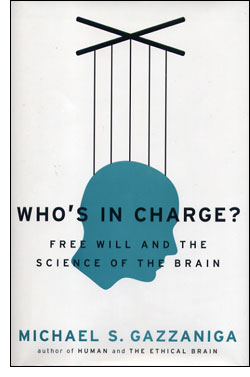 |
 |

Michael S. Gazzaniga
Who's in Charge? Free Will and the Science of the Brain
Ecco / HarperCollins
US Hardcover First Edition
ISBN 978-0-061-90610-7
Publication Date: 11-15-2011
262 pages ; $27.99
Date Reviewed: 01-03-2012
Reviewed by: Rick Kleffel © 2012
Index:
Non-Fiction
Science Fiction
Mystery
The question is not new. But every year, every day, every hour, every minute, every second of our lives the framework within which we ask it shifts: Are we in control of our own minds? Aristotle and Plato differed on the seat of the soul and whether the mind survived death. Centuries later, René Descartes pronounced that the mind was not a physical substance; it was something separate from the brain. By the early 20th century, Einstein famously declared, "...the concept of a soul without a body seems to me to be empty and devoid of meaning."
In the 21st century, with the aid of fMRI technology, we can actually see the mind at work, but we're no closer to settling that ancient dispute. Logic and neuroscience tell us — to a degree — that we are just walking machines of meat, a sustained chemical reaction that eventually and predictably will peter out. Logic be damned. Everyone human has, and likely always will feel very differently about it. "I am not a number — I am a free man!"
Michael Gazzaniga is a neuroscientist, but he's no prisoner of the science he practices. He asks the question about our minds that is always at the back of our minds in 'Who's in Charge? Free Will and the Science of the Brain,' and comes up with a book-length answer to the literally ageless question. Surprisingly, he mostly steers clear of the high tech, and turns in a dense, entertaining look at the logic with which we can divine the divine within ourselves. The power of language and storytelling, especially as used in this book, prove to be the ultimate tool with which we have hope of finding an answer to a question that is not nearly so simple as it first seems.
Gazzaniga's book takes readers on a journey through our understanding of our own minds, and it's a fascinating tour. Asked to speak on the topic for the Gifford Lecture series in Scotland, Gazzaniga decided to review what we knew at a variety of levels, from sub-atomic physics to social interactions. Up front, he offers a very definitive answer to the ageless question; the italics are his: "We are personally responsible agents and are to be held accountable for our actions, even though we live in a determined world."
What this works out to for the reader is a gripping and literally mind-boggling reading experience. The "reading experience" phrase is important, as this is a book about your mind that will change the view of your mind on your mind even as you read it. It's the Ouroboros of neuroscience, a story about the importance of storytelling to our mind's ability to understand itself.
Gazzaniga writes in clear, simple prose and makes complex ideas approachable. He's entertaining and informal, often quite funny. Given the import of storytelling in this book, it's good that he proves to be adept at it himself. Whether he's parsing the logic of divided brains or splitting atoms, he keeps the reader along the ride. And given the huge amount of time and concepts he covers, the book is admirably brief. It's a smart argument for the soul of the writer.
Readers who enjoy both science fiction and mysteries will find a lot to like in this book that ponders the frontiers of our mind both legally and scientifically. The legal implications of Gazzaniga's book are of particular interest to those in the legal profession as well. Gazzaniga's informed speculations and questions will lead many readers to see the legal codes we create in a startling and very consequential new light.
One expects a large proportion of fMRI and other scan data to support all this, but Gazzaniga goes one better. He's the brilliant man, who as an undergraduate (italics mine this time around), devised a series of logic and perception tests for split-brain epileptic patients that have literally soul-shaking implications. As we learn the mechanics of the brain — and yes, there are mechanics — the mystery does not become clearer. We know more about what happens, and yes, there is a deterministic view in all this, but we know less about how to put it all together. Gazzaniga manages the unique task of telling us we don't yet have the words to exactly even form the question, let alone provide a firm answer, even as he himself does both. We are walking paradoxes.
The term "we" also proves to be important to Gazzaniga, who is willing to take unanswered questions to the next level, as he explores what happens to consciousness when it is not alone. This proves to be the scientist doing what he does best; asking questions that nobody has asked in the quite the manner he has, so that as he explores the answers, our reading minds put together the story and follow along. Humans are indeed a narrative species, and it's easy for each individual storyteller to get caught up in his or her own narrative. We must remember that, as a narrative species, our stories require more than storytellers; they require an audience, unpredictable and unknowable until we encounter them.
|
 |
|
|
 |
| |
Review Archive
All Reviews alphabetized by author.
General Fiction
Non-Genre, general fiction and literature.
Horror
Supernatural fiction, supernatural horror and non-supernatural horror.
Science Fiction
Science fiction, science fantasy, speculative fiction, alternate history.
Fantasy
Fantasy, surrealism and magic realism.
Mystery
Crime, thrillers, mystery, suspense.
Non-Fiction
Non-Fiction, True Crime, Forteana, Reference.
Poetry
|
|
 |
|




